Squarespace has long been a go-to option for many, offering an intuitive interface and sleek designs. Its drag-and-drop editor and beautiful templates make it easy to create visually stunning websites.
But let’s face it – it’s not the perfect fit for everyone. Whether you’re looking for more flexibility, better e-commerce features, or simply a change of pace, there are plenty of worthy Squarespace alternatives out there.
In this guide, I’ll discuss 10 top contenders that could be your ideal website-building solution in 2025.
Top 10 Squarespace Alternatives 2025: At A Glance
Before we dive into the details, here’s a quick overview of the platforms we’ll be covering, along with their starting prices:
| Platform | Starting Price (Monthly) |
|---|---|
| Wix | £9 |
| WordPress | £8 |
| Shopify | £25 |
| Weebly | £7 |
| Webflow | $14 |
| GoDaddy Website Builder | £7.99 |
| Duda | $25 |
| BigCommerce | $39 |
| Strikingly | $6 |
| Hostinger Website Builder | £2.59 |
Now, let’s take a closer look at each of these alternatives. I’ll share my personal experiences and insights to help you determine which platform might be the best fit for your needs.
1. Wix
Wix has been my go-to recommendation for many clients looking for an easy-to-use yet powerful website builder. It offers an impressive array of customization options through its intuitive drag-and-drop editor.
Wix’s flexibility sets Wix apart – you’re not confined to rigid templates, allowing for truly unique designs. I’ve found it particularly great for small businesses and creatives who want a professional-looking site without the need for coding skills.

Key features:
- Over 800 customizable templates
- Robust app market for added functionality
- AI-powered Wix API for quick site creation
- Built-in SEO tools and mobile optimization
- Integrated e-commerce capabilities
Pros:
- Extremely flexible design options
- User-friendly interface suitable for beginners
- Wide range of apps and integrations
- Free plan available for testing
Cons:
- Can be overwhelming with too many choices
- Difficult to switch templates after site creation
- Some advanced features require paid plans
Pricing:
£9 to £119 per month
2. WordPress
WordPress powers over 40% of all websites. It offers users unparalleled flexibility and scalability.
For users exploring alternatives to Squarespace, WordPress remains one of the most flexible and powerful options available. Its open-source nature allows for endless customization, but getting the most out of it requires proper setup and performance tuning. Resources like WordPress site optimization and setup can help beginners and pros alike build fast, secure, and scalable websites. This makes WordPress a strong contender for anyone looking to go beyond template-based platforms.

Key features:
- Thousands of themes and plugins
- Full control over your website’s code
- Robust content management system
- SEO-friendly structure
- Extensive community support
Pros:
- Extremely customizable and scalable
- Huge ecosystem of themes and plugins
- Self-hosted option for full control
- Large community for support and resources
Cons:
- Steeper learning curve for beginners
- Requires more hands-on maintenance
- Can be vulnerable to security issues if not properly managed
Pricing:
£8 to £55 per month
3. Shopify
For those focused primarily on e-commerce, Shopify is hard to beat. I’ve helped several clients transition from Squarespace to Shopify for their online stores, and the difference in features and scalability is significant.
It’s designed specifically for selling products online, offering robust inventory management, payment processing, and marketing tools.

Key features:
- All-in-one e-commerce platform
- Extensive app store for added functionality
- Built-in payment processing
- Multichannel selling capabilities
- Advanced inventory and order management
Pros:
- Powerful e-commerce features out of the box
- Easy to use for beginners
- Excellent customer support
- Scalable for growing businesses
Cons:
- Monthly fees can add up with apps and higher plans
- Limited customization compared to open-source platforms
- Transaction fees unless using Shopify Payments
Pricing:
- Basic Shopify: £25/month
- Shopify: £65/month
- Advanced Shopify: £344/month
4. Weebly
Weebly strikes a nice balance between ease of use and functionality. I often recommend it to clients who find Wix overwhelming but want more flexibility than Squarespace offers.
Its drag-and-drop editor is intuitive, and while the design options aren’t as extensive as some competitors, it’s more than sufficient for most small business needs.
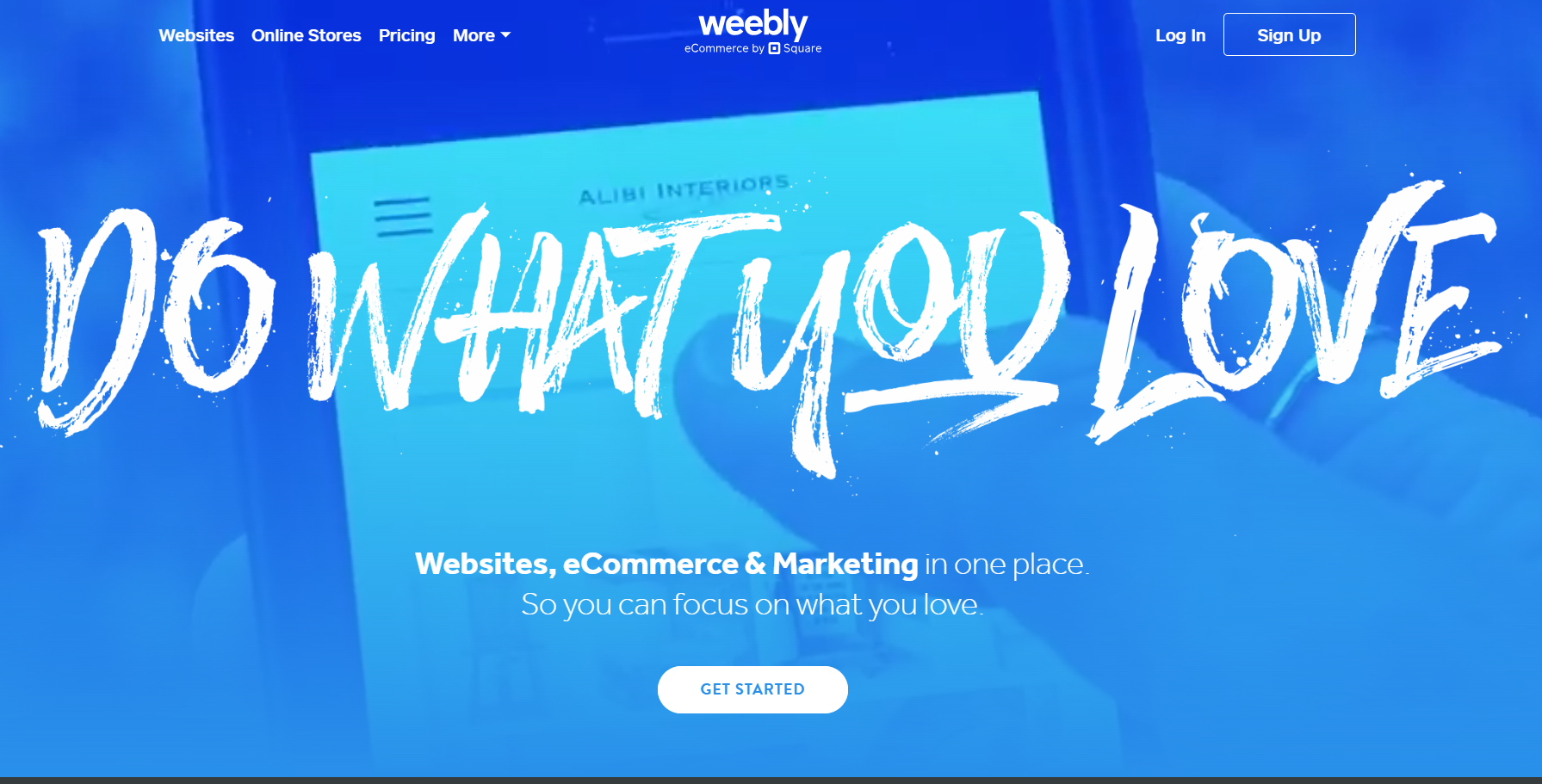
Key features:
- Easy-to-use drag-and-drop editor
- Responsive themes for mobile optimization
- Built-in SEO tools
- E-commerce capabilities on higher plans
- App center for extended functionality
Pros:
- Very user-friendly interface
- Affordable pricing options
- Solid e-commerce features for small stores
- Free plan available
Cons:
- Limited design flexibility compared to some alternatives
- Fewer advanced features for larger businesses
- Some key features only available on higher plans
Pricing: Starts at £7/month and goes upto £19/month
5. Webflow
Webflow is a powerful platform that bridges the gap between visual website builders and custom coding.
I love how Webflow gives you granular control over your site’s design without having to write code from scratch. It’s not for everyone, but for designers and agencies looking to create unique, interactive websites, it’s an excellent choice.
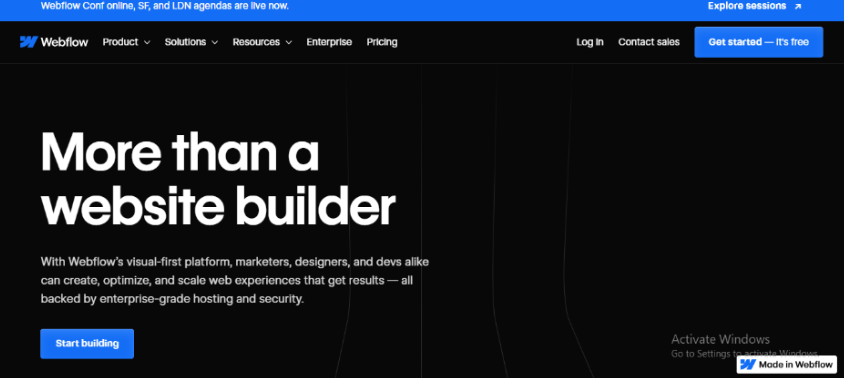
Key features:
- Visual CSS styling and layout tools
- Responsive design capabilities
- CMS for dynamic content
- Custom animations and interactions
- Direct code export option
Pros:
- Extremely flexible design capabilities
- Produces clean, efficient code
- Great for creating custom, interactive websites
- Powerful CMS for dynamic content
Cons:
- Steeper learning curve than most visual builders
- Can be overkill for simple websites
- Pricing can be expensive for larger sites
Pricing:
- Basic: $14/month
- CMS: $23/month
- Business: $39/month
- Enterprise: Custom pricing
6. GoDaddy Website Builder
GoDaddy’s Website Builder is all about simplicity and speed. It’s hard to beat if you need to create a basic website quickly.
While it doesn’t offer the depth of customization you’ll find with some alternatives, its straightforward approach and integrated marketing tools make it a solid choice for small businesses and individuals who want a no-fuss online presence.
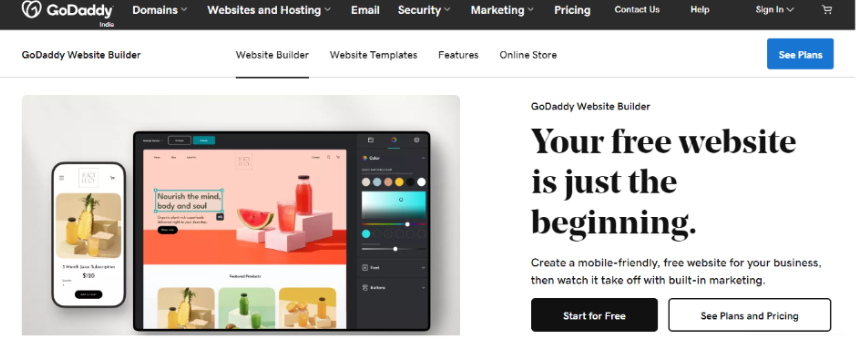
Key features:
- AI-powered website creation
- Integrated email marketing and SEO tools
- Mobile-responsive designs
- Basic e-commerce capabilities
- Social media integration
Pros:
- Very quick and easy to set up a website
- All-in-one solution with domain, hosting, and email
- Good for beginners with limited tech skills
- Affordable pricing
Cons:
- Limited design flexibility and customization
- Basic e-commerce features compared to specialized platforms
- Can feel restrictive for more advanced users
Pricing:
- Basic: £7.99/month
- Standard: £9.99/month
- Premium: £11.99/month
- Commerce: £13.99/month
7. Duda
Duda is a bit of a hidden gem in the website builder world. It’s particularly well-suited for web design agencies and freelancers building sites for clients.
I’ve used it for several client projects and have been impressed by its team collaboration features and white-labeling options. The platform offers a good balance of ease of use and advanced functionality.

Key features:
- Team collaboration tools
- White-labeling for agencies
- Responsive and customizable templates
- Dynamic content personalization
- Multilingual websites
Pros:
- Excellent for agencies and freelancers
- Strong performance and loading speeds
- Advanced design capabilities
- Good e-commerce features
Cons:
- More expensive than some alternatives
- Smaller app marketplace compared to competitors
- Can be complex for individual users
Pricing: Starting at $25/month
8. BigCommerce
BigCommerce is another powerful e-commerce platform that’s worth considering if you’re outgrowing Squarespace’s online store capabilities.
It offers more advanced features and greater scalability than Squarespace, making it suitable for larger or rapidly growing online businesses. I’ve worked with clients who’ve successfully scaled their operations using BigCommerce.

Key features:
- Robust inventory management
- Multi-channel selling capabilities
- Extensive payment gateway options
- Advanced SEO tools
- Customizable checkout process
Pros:
- Scalable for growing businesses
- No transaction fees
- Strong SEO features
- Extensive B2B features
Cons:
- Steeper learning curve than some alternatives
- Can be expensive for smaller businesses
- Limited free themes compared to some competitors
Pricing: Starting at $39/month
9. Strikingly
Strikingly takes a unique approach by focusing on single-page websites. It’s an excellent choice for personal branding, portfolios, or simple business sites.
I’ve found it particularly useful for clients who need a quick, professional online presence without the complexity of a multi-page site. The platform is incredibly easy to use, even for complete beginners.
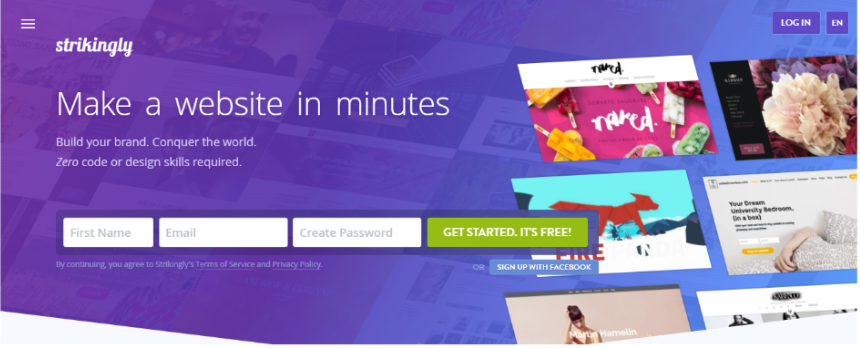
Key features:
- One-page website focus
- Simple, intuitive editor
- Mobile-first design approach
- Basic e-commerce capabilities
- Built-in blogging platform
Pros:
- Very easy to use, even for beginners
- Fast website creation process
- Good for personal branding and portfolios
- Affordable pricing options
Cons:
- Limited to single-page designs (multi-page available on higher plans)
- Basic e-commerce features
- Less suitable for complex websites
Pricing: Starting at $6/month
10. Hostinger Website Builder
Hostinger’s Website Builder is a newer offering that’s quickly gaining popularity due to its combination of simplicity and affordability.
It’s a good option if you’re looking for a straightforward way to create a website without breaking the bank. While it doesn’t offer the depth of features you’ll find with some alternatives, it covers the basics well and integrates seamlessly with Hostinger’s hosting services.
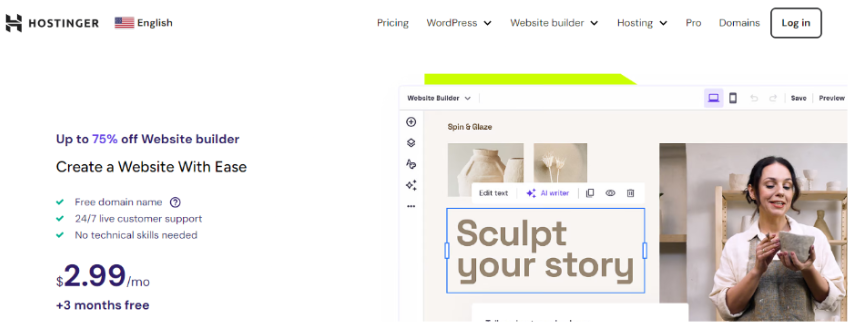
Key features:
- AI-powered website creation
- Responsive templates
- Basic SEO tools
- E-commerce capabilities
- Free domain and SSL certificate (on some plans)
Pros:
- Very affordable pricing
- Easy to use for beginners
- Integrated hosting and domain services
- Good uptime and performance
Cons:
- Limited design flexibility compared to some alternatives
- Fewer advanced features for complex websites
- Smaller template library than some competitors
Pricing: Starts at £2.59/month
How To Choose The Right Alternative
Selecting the best Squarespace alternative depends on your specific needs and goals. Here’s how to approach the decision:
- Assess your needs: First, clearly define what you want your website to do. Are you building a simple portfolio, a complex e-commerce store, or something in between? Make a list of must-have features and prioritize them.
- Consider your budget: Determine how much you’re willing to spend monthly or annually on your website. Remember to factor in potential costs for add-ons, premium themes, or additional services.
- Evaluate your technical skills: Be honest about your comfort level with technology. If you’re not tech-savvy, prioritize platforms with user-friendly interfaces and good customer support.
- Think about scalability: Consider your long-term goals. Choose a platform that can grow with your business to avoid the hassle of migrating to a new system later.
Related Reads:
Conclusion: Wix, WordPress, And Shopify Are The Top 3 Squarespace Alternatives
Based on my experience and the needs of most users, I’d recommend Wix, WordPress, and Shopify as the top three Squarespace alternatives. Wix offers great flexibility for general websites, WordPress provides unparalleled customization for those willing to learn, and Shopify is the go-to for serious e-commerce businesses.
Choosing the right website builder is a personal decision that depends on your specific needs, skills, and goals. While Squarespace is an excellent platform, exploring alternatives can lead you to a solution that better fits your unique requirements. Don’t be afraid to take advantage of free trials and plans to test out different options before making your final decision.
FAQs
Squarespace is excellent for many users, especially those prioritizing design. However, “best” depends on individual needs. For greater customization, consider WordPress. For e-commerce, Shopify might be better.
Most platforms offer migration tools or services. The process varies in complexity depending on your site’s structure and the new platform you choose. Always back up your content before migrating.
Several alternatives offer free plans, including Wix, WordPress.com, and Weebly. However, free plans often have limitations and display ads on your site.
For dedicated e-commerce, Shopify and BigCommerce are top choices. They offer more advanced features for online stores compared to Squarespace.
Most alternatives, like Wix and Weebly, don’t require coding skills. However, knowing some HTML/CSS can be helpful for customizations on platforms like WordPress.
